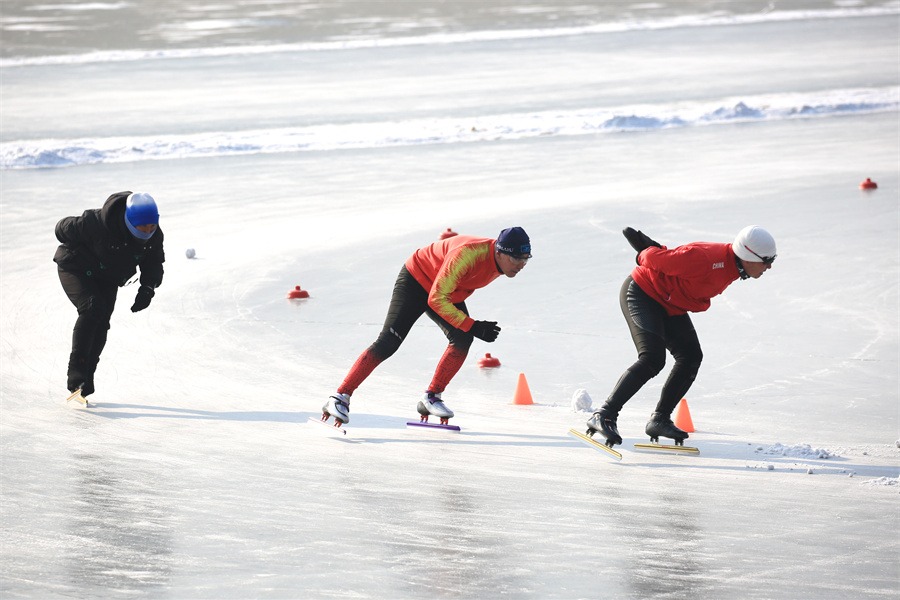Xi lays out his caring credentials in provincial trip

Party leader pledges to look after the poor and stay close to the people
China's top leader Xi Jinping met poor villagers and migrant workers during a visit to Gansu province from Feb 2 to 5 in a move analysts said reflects the leadership's desire to mingle with the grassroots and tackle poverty.
In a journey that took him over hilly, bumpy roads, Xi visited Yuangudui village in Dingxi city, 2,440 meters above sea level, on Feb 3.
The Party chief met local Party members and villagers and talked with them about ways to alleviate poverty.
"I was in northern Shaanxi about 40 years ago and life was hard too. ... Now the conditions there have improved," Xinhua News Agency's micro blog quoted Xi as saying.
"The Party and the government will help you ... with our joint efforts to make life better."
He also extended New Year's greetings to them. Chinese New Year falls on Feb 10.
A total of 447 families in Yuangudui received gifts including flour, cooking oil, pork and quilt from the Party chief. Students received schoolbags, pencil boxes and dictionaries.
Wu Hui, associate professor of Party building at the Party School of the Communist Party of China Central Committee, said Xi's latest moves show that the new generation of Party leaders has made fighting poverty its top priority, as well as maintaining closer connections with the people.
Bordering the Qinghai-Tibet Plateau, the Inner Mongolia Plateau and the Loess Plateau, Gansu is one of China's poorest provinces. The net per capita income of its farmers last year was a little more than 4,500 yuan ($720; 530 euros).
"Xi's visit to Gansu, as well as his earlier visit to poor villages in Hebei in December, sent a message that the country's top leaders care about people's lives, and shows their resolve to close the income gap and pull poor people out of poverty," he said.
In general, the public has high expectations of the new generation of Party and government leaders, paying particular attention to what they say and what they do, he said. "People hope the leaders can deal with their concerns."
The public appreciated the visit to poor villages, he said.
Wu said a clearer outline might be laid out after the new sessions of the national legislators and political advisers to be held next month.
"Ultimately, the key to getting people's support is new policies and putting them into practice."
At a vegetable market in Lanzhou, capital of Gansu, Xi asked about price rises and the availability of food.
Li Fengying, a vegetable seller who spoke to Xi, said: "I was excited to meet him, and glad to see he is concerned about prices. Traditionally just before the New Year festival food prices rise."
Xi asked local officials to guarantee the supply so that people could enjoy the festival. The same day he visited a restaurant in Lanzhou where senior citizens can enjoy subsidized meals.
"Is the food enough?" he said. "Is it properly prepared and clean? How many restaurants of this kind are there in the city?"
In a gesture of respect to the elderly, Xi picked up a food plate and took it over to Yang Lintai, 72.
"Xi attached great importance to the welfare of senior citizens when he was top leader in Shanghai," said Guo Ping, a researcher at the China Research Center on Aging.
"Xi's visit to the restaurant signals that the new generation of Party leaders will give the elderly a higher priority."
During his four-day visit to Gansu, Xi also visited a reconstruction site in Dongxiang autonomous county, where a landslide occurred in March 2011.
Chatting with migrant workers, he said a prosperous society could not be realized without their contribution.
Xi called for more care for those workers and more effort to protect their rights and interests. He said: "In particular, migrant workers ought to be paid on time, and in full."
Ye Duchu, another expert of Party building at the Party School of the CPC Central Committee, said Xi's latest moves reveal how much the new generation of Party leaders cared about people's welfare.
"It's the Party's great tradition to mingle with the grassroots, and Xi has set a good example for Party and government officials at all levels."
In a meeting with local officials, Xi said a down-to-earth attitude, a good work ethic and an ability to eschew empty gestures are some of the key characteristics officials need if they are to be promoted.
Officials who are out for pleasure and who love formality must be brought into line, he said.
Xi urged officials to spend more time with the public to deal with their problems and concerns, and work harder to develop poor regions.
His remarks reflected the new leadership's determination to improve the Party and government's image and the way it works.
A good work ethic and personal integrity should be the key criteria in selecting, evaluating and promoting officials, Xi said.
The comments came against the backdrop of recent scandals involving officials suspected of abusing their power, including embezzlement.
Wu Hui of the Party School of the CPC Central Committee said: "China has entered a crucial period that means the government and local authorities have to narrow the gap between developed and underdeveloped regions. That means that officials at all levels must have a good work ethic and have close ties with the public.
"To achieve the goal of building a prosperous society, the government must ensure that the incomes of residents in remote, poor areas rise rapidly in coming years, and the key lies in the work of local officials. That's why Xi emphasized work ethics and integrity in Gansu."
Contact the writers at [email protected] and [email protected]
(China Daily 02/08/2013 page3)
Today's Top News
- Xi calls for fostering new highlights in China-Sri Lanka cooperation
- AI curbs show Biden's rejection of cooperation: China Daily editorial
- Global medical minds unleash hospital innovation trends
- Xi urges China, Vietnam to step up connectivity, new quality productive forces cooperation
- Xi holds phone talks with Vietnam's top leader To Lam
- Chinese, Sri Lankan presidents hold talks in Beijing






























